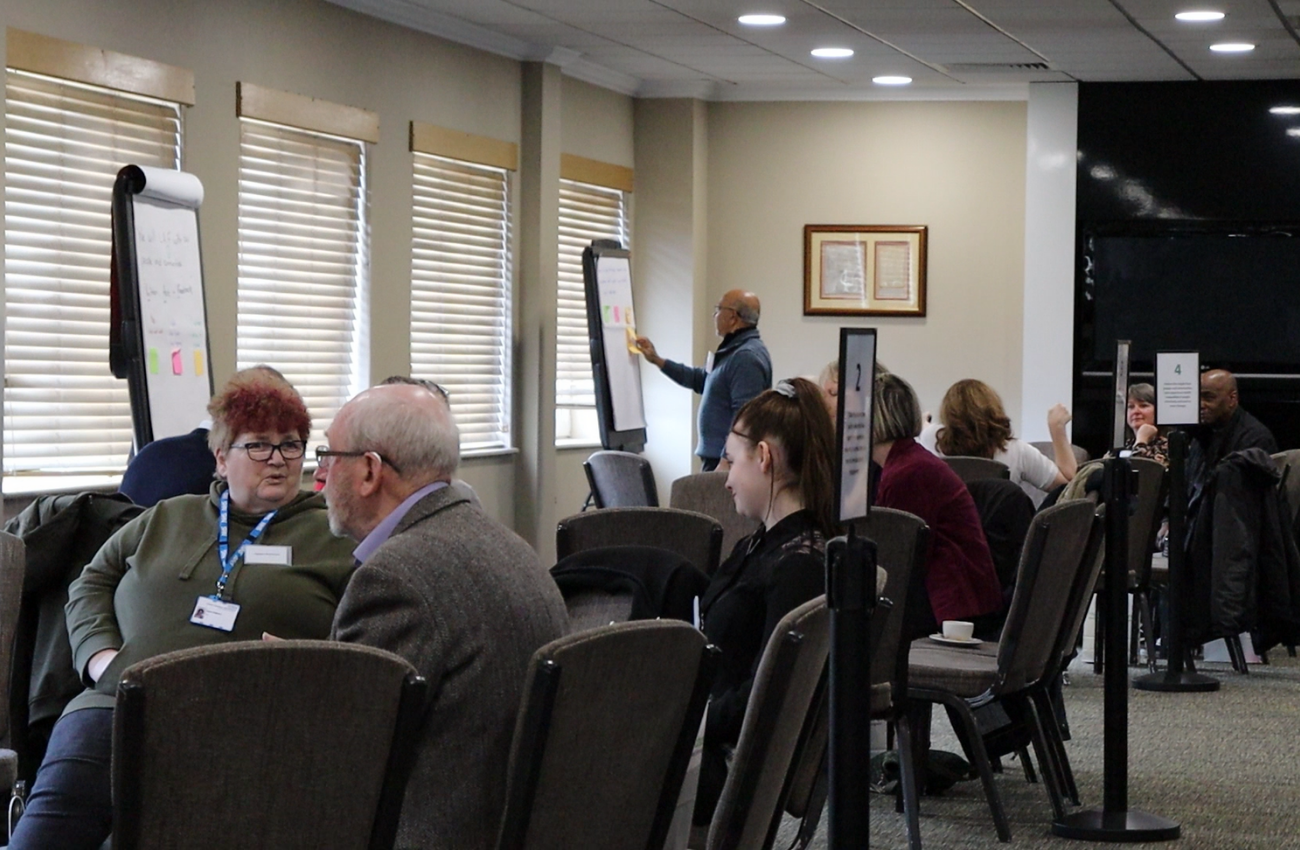Here you'll find a collection of COVID-19 stories from local people to help educate, inspire and inform others.
Thank you to all of our volunteers who have helped create a powerful library of stories.
Your COVID-19 stories
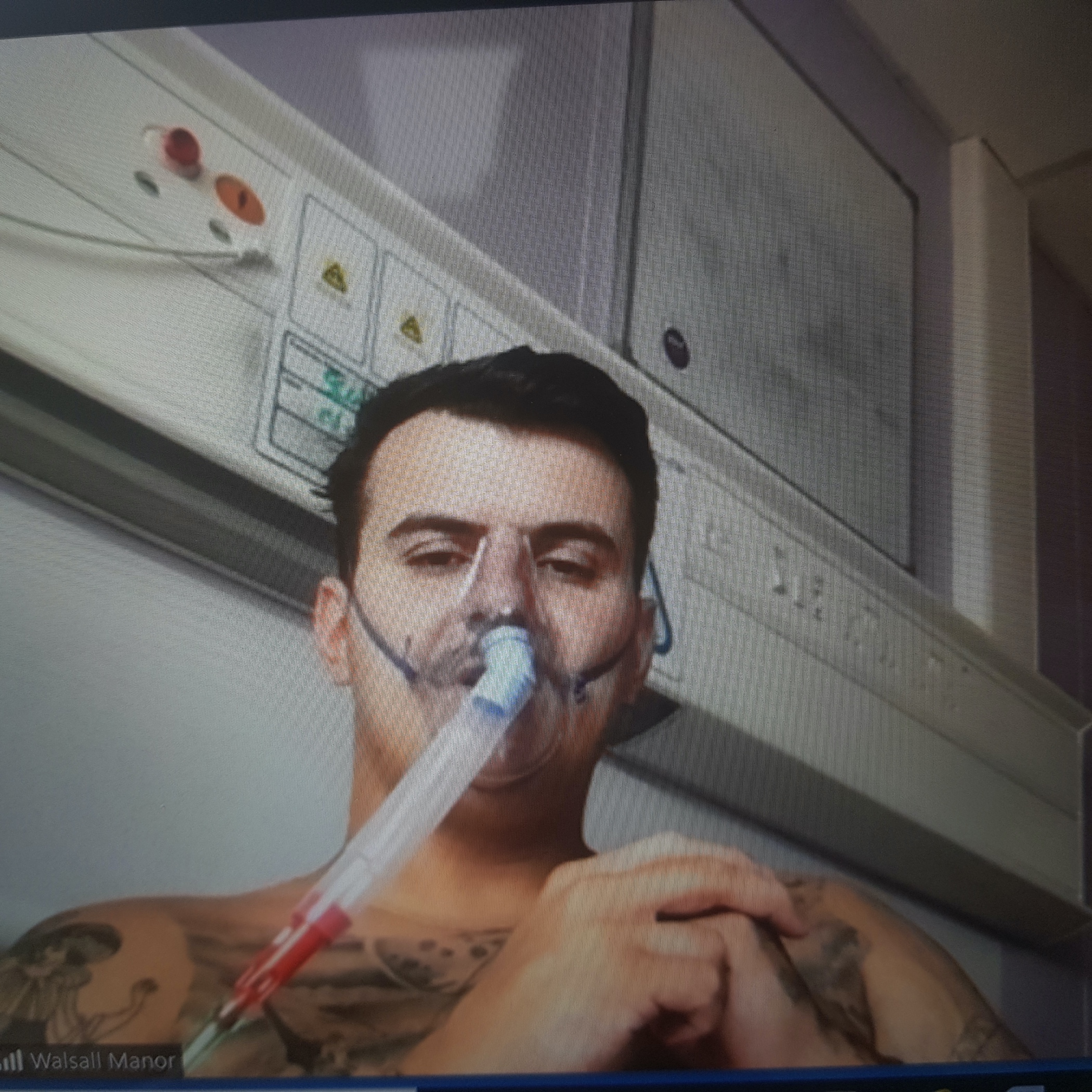
Scott, 27 is in Walsall Manor Hospital with COVID-19, pneumonia and a chest infection. He kept putting off his vaccine and now wants to urge young people to get their vaccine sooner rather than later.
Just a month before Scott became ill he had scaled Scafell Pike, England’s highest mountain, but suddenly he became breathless just getting out of bed and walking around the house.
“My girlfriend kept telling me ‘you’ve got to get the vaccine’, but I was one of those people who left it,” said Scott. “My girlfriend and my mum and dad have had both jabs and they are all fine. I would tell people 100 per cent, get double jabbed.”
Scott, now a week into his hospital admission, had received his first dose just seven days before he believes he contracted COVID-19. The first dose should give good protection after a couple of weeks it has been given. Two doses are required for stronger and longer-lasting protection.
“It started with a snuffle then a cough,” he recalled. “But the next day I have never felt so ill. I couldn’t walk to the bathroom or downstairs without being completely out of breath. Everything I was doing was taking my breath away and it felt like I’d got a clamp on my chest it was so tight. So, I decided to get myself checked out and an ambulance was here within 20 minutes.”
Scott has needed oxygen ever since he was admitted to hospital, but his condition is improving and he is hoping to leave in the next few days.
If you are aged 18 or over, in an at-risk group, a carer or a frontline health and social care worker who has not yet had your vaccine, please get your vaccine as soon as you can.
You’ll need two doses for maximum protection – this is due 8 weeks after your first.
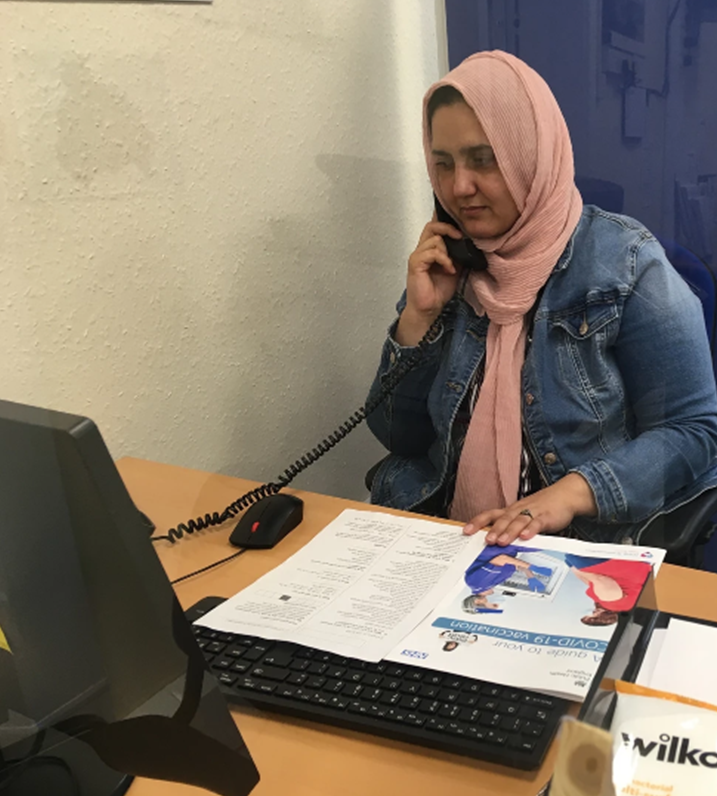
The COVID-19 Community Champions programme aims to support residents from under-represented groups who may be most at risk from COVID-19.
As part of the programme, organisations have recruited and trained community champions to receive the latest COVID-19 information to share with communities.
One of our partner organisations, the Refugee and Migrant Centre (RMC), recruited three community champions to support their project activity in a volunteering capacity. One of them is Shahida Tariq, who has shared her story as a champion.
To read the full story, visit the Walsall for All website here.
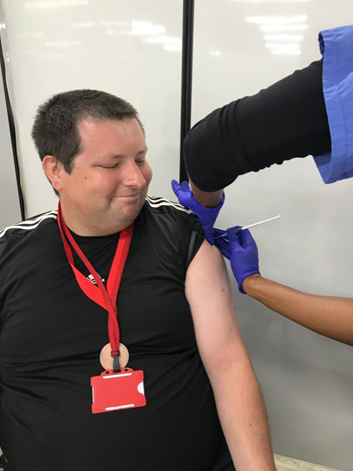
Midland Mencap is one organisation that has supported individuals with disabilities to get their COVID-19 vaccination. They recently helped Dean, aged 29 from Walsall, to make an informed choice to have his vaccination.
Click here to read the full story on the Walsall for All website.
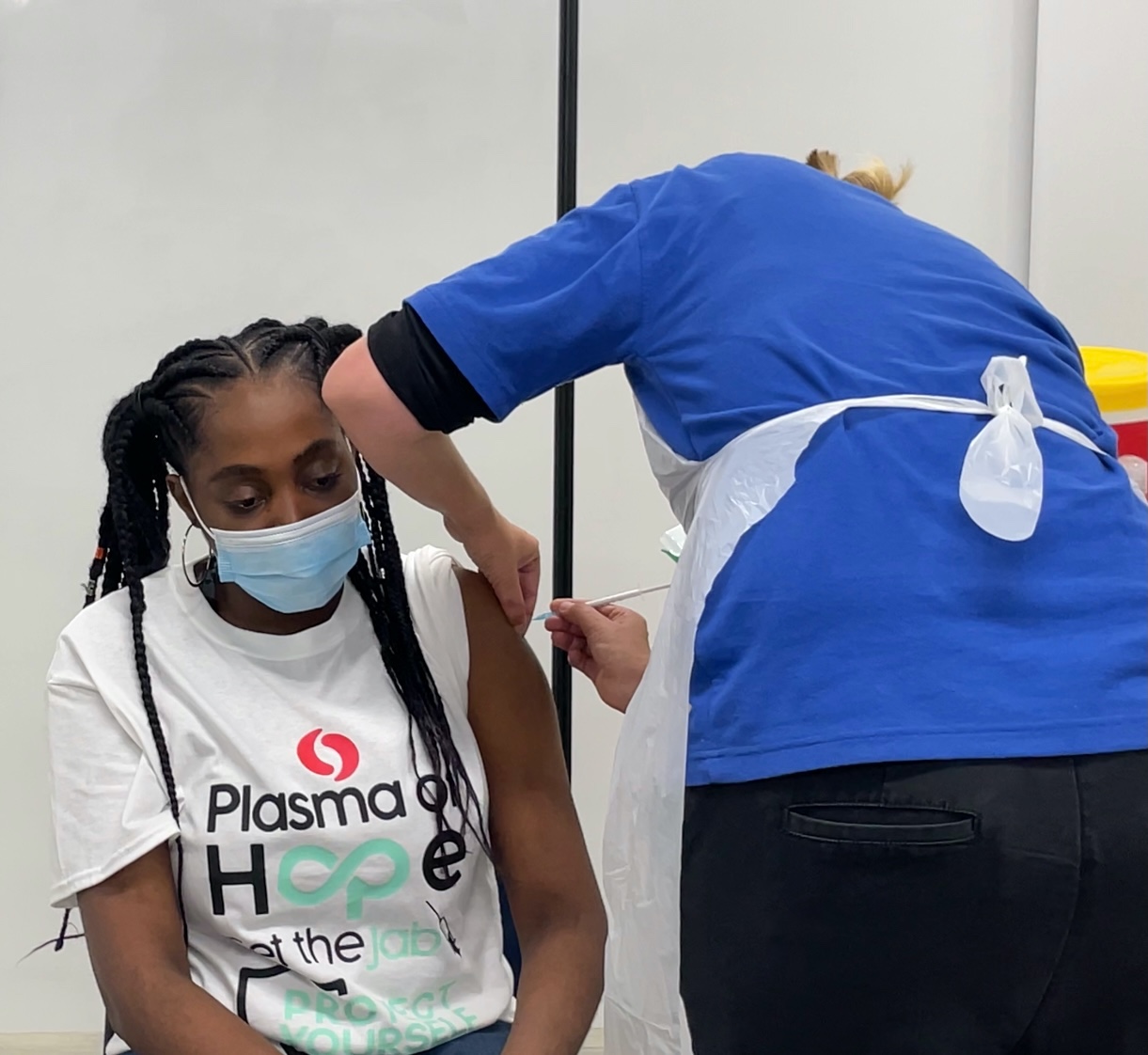
A young woman who has sickle cell disease is encouraging others to come forward for their lifesaving COVID-19 vaccine.
Sickle cell disease is a serious inherited blood disorder where the red blood cells, which carry oxygen around the body, develop abnormally. It can affect anyone but it is more prevalent in people from African and Caribbean backgrounds.
Most people with the disease are immunocompromised, which means their immune system is weaker than normal. This increases their risk of getting infections, and makes it much harder for them to recover when they do become ill. Many infections, including COVID-19, can be very serious or even fatal for people with sickle cell disease.
Seanastef said: “I’ve had sickle cell disease since I was born and it’s had a huge impact on my life. Even before COVID-19 came about, I had to take precautions with everything I did as I have an increased vulnerability to infection. I take medication every day and I regularly get admitted to hospital to help manage the pain. Most recently, I spent nearly three months in hospital getting treatment for a sickle cell related illness, and only came home a few weeks ago, which was really scary.
“As I’m clinically vulnerable, I spent all of lockdown shielding at home to help protect myself from catching the virus. It took me a while to feel comfortable going out in public, and even now the thought of leaving the house can sometimes be terrifying. I’m still wearing my face mask and social distancing when I’m in public places, so it’s been really difficult seeing other people getting back to normal, as I still need to take extra precaution.
“I got the invite for my vaccine at the start of the year but I was too nervous and worried to have it at the time. However, as I’ve been really poorly with my sickle cell disease, I didn’t want the extra worry of catching COVID-19 too, so I decided it was the right time to get it done. I’ve done my research, spoken to my friends and family who have had the vaccine and also spoke to my consultant for advice, and I know getting the jab is the best way to stay protected against the virus.
“Lots of people, especially those with sickle cell, are hesitant to get the vaccine but I would encourage everyone to come forward when they are able to. I regret not getting it sooner but knowing I’m one step closer to being fully vaccinated is so reassuring and I’ll definitely be getting my second dose in eight weeks’ time.”
Marie-Claire Kofi, Chairperson of Plasma of Hope, a charity that provides supports for people living with sickle cell disease across the West Midlands, and is currently supporting Seanastef, said: “We know that people living with sickle cell are clinically extremely vulnerable, and as a result are more at risk of serious health consequences and potentially death if they catch COVID-19.
“As someone with sickle cell disease and a weaker immune system, I understand the concerns that people have about coming forward for the vaccine, but it’s so important that they take up this offer when they can. I’ve had both my doses now to help protect myself as much as possible from serious illness, and would encourage others to do the same.”
Sally Roberts, Chief Nursing Officer, said: “With the majority of restrictions now lifted, many people think that normal life has resumed, but that simply is not the case for everyone. It’s so important that we all understand that getting the vaccine isn’t just about protecting ourselves, it’s about shielding others too.
“Getting both doses of the vaccine is the best protection you have against this deadly virus. It will not only reduce your chances of catching and spreading COVID-19, it will reduce your chance of becoming seriously unwell, or even dying, if you do catch it.
“Like Seanastef, if you’ve previously been offered a vaccine but didn’t take it up, please know that the offer still stands and there’s a vaccine waiting for you when you’re ready. It could save your life and protect your loved ones.”
A full list of all the places you can get your COVID-19 vaccination, including bookable and walk-in services, can be found on the Covid-19 Vaccination webpage.
For more information about Plasma of Hope, visit their website.
Needle phobia, known scientifically as trypanophobia, affects around one in every 10 people and causes severe feelings of dread and anxiety at the thought of being pricked by a needle. The vaccinators and staff at local vaccination centres have been trained to support people who suffer from this common phobia to overcome their fears for a brief moment in order to get themselves protected.
One person who succeeded is 51-year-old Andrew Stait from Walsall, who recently had his second dose, and was able to do so because he believes protecting himself and his loved ones is more important.
He said: “For as long as I can remember injections of any kind have been an issue. I don’t like needles. I wouldn’t even consider travelling to a place where you need to be vaccinated before visiting. “As someone who is scared – even petrified – of injections it was always going to be a big challenge mentally. I can’t even watch a vaccination on television. Unless my back was firmly against a wall and I had no other option, then I would avoid anything that involved a needle.
“This is the one occasion when I really felt that the vaccine was not just for me but also for my family, friends and the community. With COVID-19 we are all in it together, and by getting vaccinated we are not just looking after ourselves but each other.
“No matter how mentally challenging for some a vaccination is, I would imagine that it would be many, many times more challenging if you were to pass it on to an older person and the possible consequences.
“Two short visits to the vaccination centre gives you hope and confidence to face the future.”
Andrew received his vaccination at the Saddlers Centre in Walsall, where he says the staff took his fears seriously. He was able to take someone for moral support on both occasions and go to a screened-off area so he could take his time getting mentally prepared for the jab.
Dr Salma Reehana, local GP, said: “Andrew is a real inspiration for the thousands of people who are hesitant about getting the COVID-19 vaccine because of a phobia of needles.
“We take people’s fears very seriously and all our sites are equipped to support you through making this important decision and ensuring the process is as comfortable for you as possible.
“Andrew says it best when he points out that vaccination is for your loved ones and your community as much as it is for yourself. If you do feel able to put aside your fears and get the jab, you’re playing an incredibly important role in our shared battle against this terrible virus.”
A Dudley couple who were among the first people in the Black Country and West Birmingham to receive a COVID vaccine at their GP practice have been reflecting on the experience one year on.
Tuesday (14 December) will mark a year to the day that 82-year-old Gerry Hughes and 85-year-old Maureen Hughes received the COVID-19 vaccine.
The couple were the first to be vaccinated at their local GP surgery, Halesowen Medical Practice, which marked the start of the vaccine roll-out co-ordinated by GP-led primary care networks.
Gerry and Maureen went on to receive their second dose in January this year, and their booster dose six months later in June.
Gerry said: “During the lockdown last year, we were both shielding as Maureen has COPD which can affect her lungs and her breathing. We didn’t want to take any risks so we stayed at home and started ordering our food shopping online. The isolation was the hardest part, especially not seeing our family. Luckily, we have a lovely garden that we could sit in and spend time outdoors, so we felt very fortunate compared to others. We tend to take things in our stride so we just tried to make the best of out of a bad situation.
“We both had our first COVID-19 vaccine on 14 December last year at our doctor’s surgery. When we first got the call inviting us to come in for the vaccine, we didn’t feel nervous at all – we actually felt really excited. After we had the first dose, we both had sore arms and felt a little bit tired, but nothing that lasted more than a few days.
“We have two daughters and three grandchildren and they’ve all had their vaccines now too. In fact, one of our daughters works in a dental department of a hospital and now helps administer the vaccines. She was absolutely delighted when we received our invite to have the vaccine last year and fully supported us having it.
“We’ve had our two doses and booster dose now and everything went really smoothly. Our GP practice has really looked after us and I think it’s a no brainer that others should get the vaccine too. You can get lots of problems from the virus, regardless of age, so I think everyone should get it as soon as possible.
“Going into Christmas this year feels very different to last year. Last year, we’d just had our first dose but no one else in our immediate family had so we still had to be very careful and keep contact to a minimum. This year, we feel really excited to celebrate Christmas with our family knowing we’ve got the protection from the vaccines. Of course, we’ll still be following the guidelines, washing our hands often and wearing a mask where we need to, to make sure we stay safe.”
Sally Roberts, Chief Nursing Officer, said: “This time last year, GPs across the area embarked on an enormous challenge to deliver the COVID-19 vaccination programme in the community, whilst also delivering the flu vaccine programme and the usual care and services patients rely on.
“Since then, we’ve seen a momentous effort right across the local area to get people vaccinated, and will continue until as many people as possible are protected against this deadly virus, whether that’s at GP practices, pharmacies, mobile clinics or vaccination centres.
“Getting vaccinated is important to not only protect yourself, but also the people around you, and to help slow the spread of the virus in the wider community as we approach the festive season. Our offer of a jab is evergreen and I strongly encourage anyone who is eligible for a first, second or booster dose, to come forward as soon as they can.”
For more information and resources on the COVID-19 vaccine, click visit our webpage on the vaccine.
COVID- 19 vaccine stories
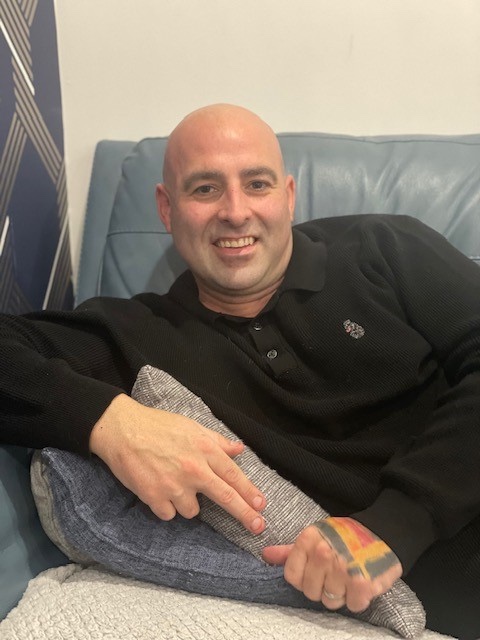
A father of two spent almost a month in Intensive Care (ICU) at New Cross Hospital after catching COVID-19. David Colley, from Willenhall, has credited being doubly vaccinated as potentially saving his life. He is now urging people to get their first, second or booster vaccines, after thinking “it wouldn’t happen to me.”
The 39-year-old was admitted to hospital on 16 November after coming home from work, feeling unwell and going downhill very quickly.
He said: “I had never been in hospital before and keep myself fit and healthy by going to the gym and mountain biking.
“I never thought it would happen to me but I am so grateful I have been able to fight it. Without my two vaccines I am not sure I would be here today.
“It’s scary because it shows that this could happen to anyone, and that it can get pretty serious. It’s important to go and get your vaccinations as you just don’t know how serious it can be. I will be getting my booster as soon as I can.”
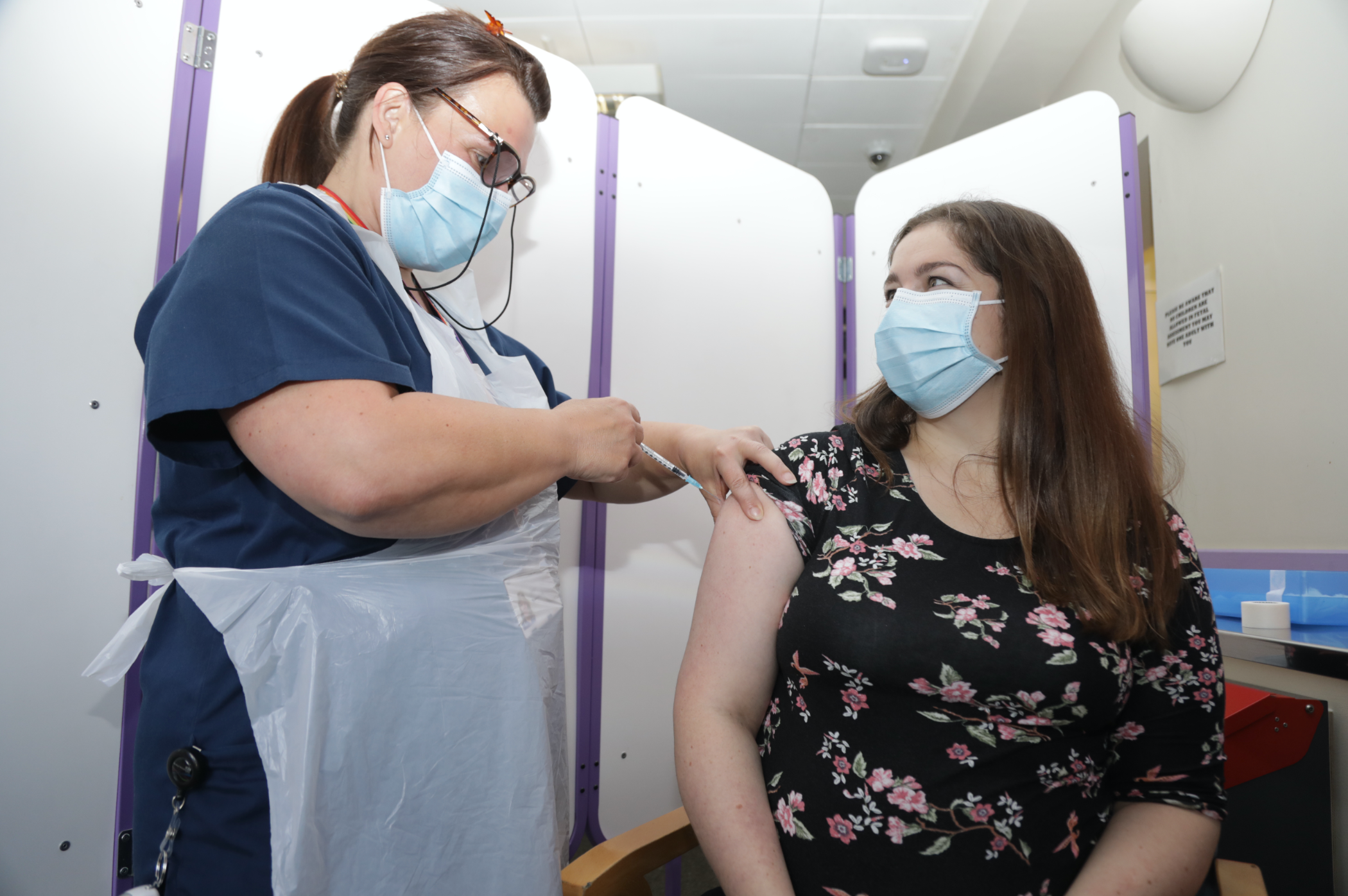
A pregnant midwife is encouraging all expectant mums across the Black Country to have the COVID-19 vaccination.
Eleanor is currently 30 weeks pregnant with her second child and has been fully vaccinated during her pregnancy. The community midwife, who works in the Black Country, is now urging all pregnant women to have the vaccine to protect themselves and their unborn babies.
Eleanor said: “As a community midwife, I speak to pregnant women every day and know that many have concerns about having the jab. When the COVID-19 vaccines first started rolling out, it was unclear whether they were suitable for pregnant women and there were lots of mixed messages being shared, which caused a lot of confusion. However, the vaccines have proven to be completely safe and effective for pregnant women.
“I had my first dose of the AstraZeneca vaccine back in March when I was 13 weeks pregnant. I did thorough research into the pros and cons of having the vaccine, and at the time lots of encouraging data was coming through from the US. Working within the community and mixing with different people every day, I decided to go ahead and get the vaccine to make sure me and my unborn baby had the best protection against COVID-19.
“Aside from a slightly sore arm and feeling a bit tired for a day or two, I had no serious side effects. I had my second dose in June at 25 weeks pregnant and now I’m fully vaccinated I feel so much safer, especially as restrictions have lifted and people are starting to mix more.
“I understand that it’s not an easy decision to make, and everyone has to do what is right for them, but for me, the risk of not having the vaccine was far greater. Studies have shown that severe illness due to this virus is more likely in later pregnancy, and those who do get symptomatic COVID-19 are two to three times more likely to give birth to their baby prematurely.
“I’m really lucky that I don’t have any underlying health conditions, but those who do are at even higher risk of suffering complications from COVID-19 during pregnancy.
“Even without COVID-19 thrown into the mix, being pregnant can feel scary and daunting at times, which is completely normal. I wanted to do what I felt was best for my baby, and for me that was to get the COVID-19 vaccination as soon as I could, just as I did with both the flu and whooping cough vaccines.
“I would encourage any pregnant woman to have the COVID-19 vaccine, but please remember you don’t have to make this decision alone. Speak to your midwife, obstetrician or GP and they can provide you with more guidance based on your personal situation.
“I’m now in my third trimester and can’t wait for our baby to arrive in September.”
Dr Francina Schreuder, Consultant Obstetrician for Royal Wolverhampton NHS Trust, said: “There has been a lot of misinformation online regarding the COVID-19 vaccine and pregnancy and this has left many women feeling concerned.
“The Royal College of Midwives and The Royal College of Obstetricians and Gynaecologists jointly state there is no evidence to suggest that the COVID-19 vaccines will affect fertility or harm the baby. Such claims are speculative and not supported by any data.
“The vaccine really is the best form of protection against the virus and the risks it presents to both mother and baby in pregnancy. It is also our best chance of getting back to normality, so please do not delay in booking your appointment.”
Pfizer and Moderna vaccines are the preferred vaccines for pregnant women of any age who are coming forward for their first dose. Anyone who has already received their first dose and is offered their second one whilst pregnant, should have a second dose with the same vaccine unless they receive alternative advice from a health professional.
Sally Roberts, Chief Nursing Officer, said: “COVID-19 vaccines offer pregnant women the best protection against the virus, which can be serious in later pregnancy for some women.
“We strongly urge all pregnant women to get the vaccine when it is offered to them, whether it’s their first or second dose, to reduce the risk not just to themselves, but also their babies.
“If you’ve already been offered a jab but haven’t taken it up yet it’s not too late, there’s still a dose with your name on it.”
A mother with COVID-19 who recently gave birth has strongly encouraged others to have the vaccine after she became so ill that her relatives were advised to prepare for her end of life care.
Shem McLeod, who turns 44 next week, gave birth prematurely on July 25 at 33 weeks. She has not had her COVID-19 vaccine and has been so poorly she has still not seen her baby son, apart from video calls. Now after five weeks in Walsall Manor Hospital and having been in a coma, she is having to learn to walk again.
Shem, who has three other sons aged 20, 11 and two, had a Caesarean at City Hospital in Birmingham after becoming ill before being transferred to Walsall Healthcare NHS Trust because of demand for beds.
“I was one of those who thought ‘it won’t happen to me’,” said Shem, who had no underlying health conditions. “I think my risk increased because I was pregnant. But I’m definitely going to have the vaccine as soon as I can and I would strongly encourage others to do the same. This experience has changed me – I want to promote the vaccine because it’s better to have the jab than be in the situation I’ve been in.
“My friends and family were told the next stage for me would be end of life care and they said ‘Are you serious?’ My heart, kidney and lungs were fighting against each other which is why they had to put me into a coma. I feel very grateful for the doctors and nurses to enable me to be here and to my family and friends for their support.”
Shem is a frontline key worker for a local authority in the Birmingham area, where she lives. Unwell with a persistent cough, she tested positive for Covid in the maternity unit. On returning home, her partner, a chef, was so worried about her condition he called for an ambulance and she was admitted to City Hospital on July 24, giving birth a day later.
“I was coughing for some time and I couldn’t shift it,” recalled Shem. “It got to a point where I was lying on the floor struggling to breathe. My last real memory was getting into the ambulance.”
At City Hospital, Shem underwent a Caesarean before being placed in an induced coma, which she says was crucial to her and her baby’s survival.
“They performed a C-section because of the danger and to save both our lives,” she added. “They stabilised me and put me into a coma and I was then transferred to Walsall.”
Shem is hoping to be able to see her baby or be allowed home to be reunited with her family. But she doesn’t know when she’s going to be well enough as she is having to learn to walk again.
“I miss all my children but it’s been especially hard with the two-year-old because he doesn’t understand why his mum isn’t there,” said Shem. “We’ve had video calls but when I was in critical care I had wires and tubes coming out of me so it wasn’t until a couple of days ago when those things were removed that he recognised me. I haven’t been able to be with my baby either – I was sedated before so I had no awareness of him, then he was taken to neonatal.
“I’m not sure when I’ll be able to go home because I wouldn’t be able to look after my children. I’ve been told it could be months before I regain my physical strength, but I’m eager to meet my new baby.”
Just two weeks before giving birth, Shem was dancing to her favourite reggae, R ‘n’ B and soul music at her cousin’s party but her legs are currently in splints for four hours at a time because her feet have ‘dropped’ after so long in bed and she can only walk a couple of steps.
“Occupational therapists have been a great help in supporting me to stand because after five weeks in bed, I’ve lost the ability to walk,” she said. “It could be months before I get back to normal.”
Shem is now back at City Hospital for her ongoing care and her baby son is at home.
*Credit to Walsall Healthcare Trust for the story.
Long COVID Stories
This video details COVID-19 survivor Stephen's experience of Long COVID.
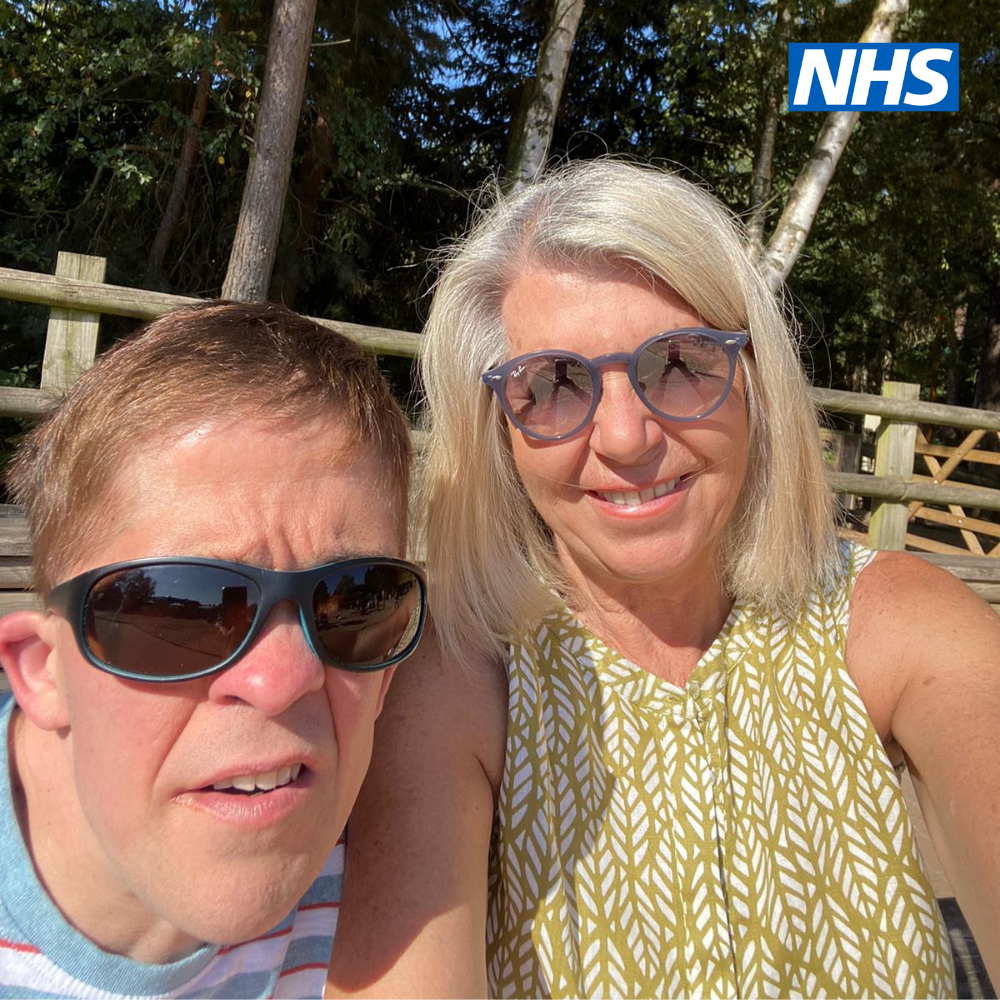
His mother, Pam Zabawa, has spent the last 18 months helping care for her son and is now urging others to take the virus seriously.
Long COVID is a term to describe the effects of COVID-19 that continues for weeks or months beyond the initial illness. The severity and duration of symptoms differ from patient to patient, but can include fatigue, breathlessness, anxiety and depression, heart palpitations, chest pain and joint or muscle pain.
The length of time that it takes to recover also varies: for some it will be days, for others weeks or months. The chances of having long-term symptoms does not seem to be linked to how ill you are when you first get the virus.
Pam said: “Dom caught COVID-19 last March when the virus was still very new and no one really knew how serious it was. He was really poorly with what we thought was a chest infection but was admitted to hospital as his oxygen levels were really low. They tested him for COVID-19 when he was first admitted and two days later his results came back positive. At the time, we all thought it was a just virus that older people got so we didn’t expect Dom who is in his thirties to catch it, let alone be seriously ill from it.
“He was in hospital for 17 days, but luckily he recovered and came home. However, we didn’t realise then that the journey had only just started for us. Dom had asthma before but it was controlled and wasn’t a massive issue, but the virus has severely impacted his lungs. He now has oxygen overnight to help with his breathing and to ease the pressure on his chest, which he never had to have before. He’s always tired, has low energy and his appetite hasn’t been the same.
“It’s been such a long journey and it’s had a massive impact on us a family. It feels like we’ve spent the last 18 months living on a knife edge, constantly worrying about Dom and his health. At times it feels like he’s turning a corner and gets a little bit better, but then suddenly he’s really poorly again and we’re taking him to hospital. He was in hospital back in May with pneumonia, which is something he is now really prone to getting due to the damage to his lungs.
“As Dom caught the virus so early on in the pandemic, no one realised the long-term effect it could have on people. Now, there’s more awareness of long COVID and clinics have started to open up, which is great. We’ve recently started working with a respiratory team, and also have a team of carers on hand, which is a massive help.
“It’s been 18 months since he first caught COVID-19 and in the last six weeks we’ve finally started to see a noticeable improvement. Whilst he is still on oxygen overnight, he seems more himself and has a lot more energy which is just brilliant, and we’re hopeful as a family that his health continues to improve.
“Dom had his vaccine earlier this year, and our whole family are now double vaccinated. We want to make sure we can protect him as much as possible as it could be devastating for us if he catches it again. It’s a risk we just don’t want to take.”
Sally Roberts, Chief Nursing Officer, said: “Many people who have had COVID-19 will have lasting symptoms, and for some these may have a big impact on their quality of life.
“Long COVID can affect anyone regardless of age or lifestyle, and so the best way to protect yourself and your loved ones from serious illness is to come forward for your jabs as quickly as possible.
“The offer of a vaccine is evergreen so if you haven’t had your first dose yet, or it’s been eight weeks and your second dose is now due, please don’t delay.”
Anyone who thinks they may be experiencing long COVID is encouraged to contact their GP to discuss their symptoms.
For more information about long COVID visit our webpage. Please watch the full video with Dom's mother, Pam, below.




